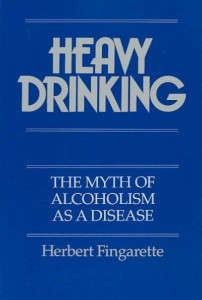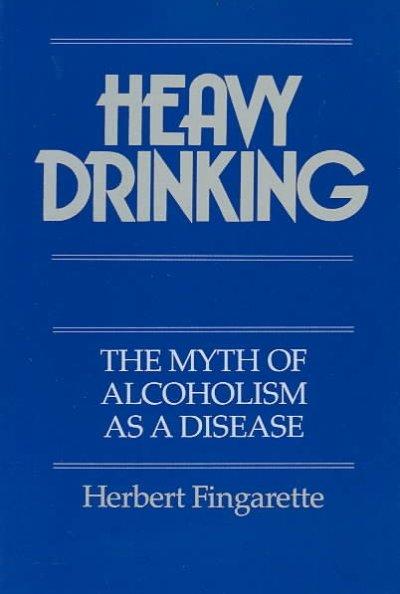 The Following is an excerpt from Heavy Drinking: The Myth of Alcoholism as a Disease, by Herbert Fingarette:
The Following is an excerpt from Heavy Drinking: The Myth of Alcoholism as a Disease, by Herbert Fingarette:
Perhaps the most widely appealing types of psychological hypotheses are those proposing to explain long-term heavy drinking in terms of learning theory…..the jargon of learning theory is loosely adopted…One may read of responses, reinforcements, and operant rewards, of learning schedules, cognitive-symbolic correlates, cognitive dissonance, personal attribution effects, and efficacy expectations.
Whatever the ultimate adequacy of these theories, we realize that we have left the realm of medicine, disease, and physiological abnormality. All the explanations of alcoholism in terms of learning theory presume that the drinker’s basic capacities for learning and unlearning are normal. The “abnormality” consists of the particular things they have learned to do – to repeatedly engage in conduct that has harmful or antisocial consequences – not of any impairment in their mental or physical learning capacities. In this context, therapy and treatment are medical-looking words that in substance refer to nonmedical procedures: to teaching heavy drinkers to do things other than drinking, and to have them learn to want to avoid heavy drinking.
This brilliant passage was published 23 years ago, in 1988. He got it right back then, when he said that most of the psychological theories simply described learning. It really makes you wonder why medical and religious institutions are allowed to monopolize (legally through regulation) the field of helping people with substance use problems. Even today, in a pamphlet distributed by the NIDA in 2010, the language of learning is prominent in their description of medical “treatment” for addiction:
How do the best treatment programs help patients recover from the pervasive effects of addiction?
…..Because addiction can affect so many aspects of a person’s life, treatment must address the needs of the whole person to be successful. This is why the best programs incorporate a variety of rehabilitative services into their comprehensive treatment regimens. Treatment counselors select from a menu of services for meeting the individual medical, psychological, social, vocational, and legal needs of their patients to foster their recovery from addiction.
- Cognitive Behavioral Therapy. Seeks to help patients recognize, avoid, and cope with the situations in which they are most likely to abuse drugs.
- Motivational Incentives. Uses positive reinforcement such as providing rewards or privileges for remaining drug free, for attending and participating in counseling sessions, or for taking treatment medications as prescribed.
- Motivational Interviewing. Employs strategies to evoke rapid and internally motivated behavior change to stop drug use and facilitate treatment entry.
- Group Therapy. Helps patients face their drug abuse realistically, come to terms with its harmful consequences, and boost their motivation to stay drug free. Patients learn effective ways to solve their emotional and interpersonal problems without resorting to drugs.
Here’s Fingarette, from 1988, again:
In this context, therapy and treatment are medical-looking words that in substance refer to nonmedical procedures: to teaching heavy drinkers to do things other than drinking, and to have them learn to want to avoid heavy drinking.
This statement is still piercing. With all of the bragging about scientific discoveries and pretty pictures of brain scans in the NIDA’s premiere piece of disease propaganda, the so-called medical treatment for addiction which they describe is hardly medical at all. It is teaching. I only wish that what they taught actually did enough to help people embrace other behaviors. Unfortunately, they do a lot of teaching people to be helpless, powerless, and to stay eternally focused on struggling with addiction rather than moving on with life.
